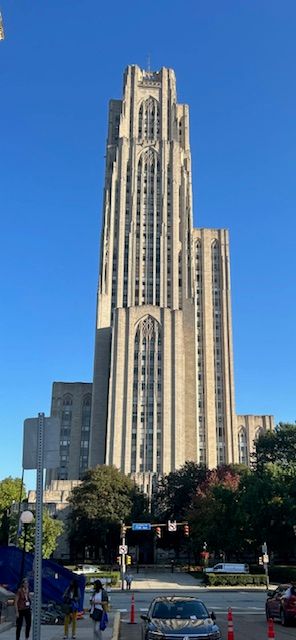The Area: The University of Pittsburgh ("Pitt") is located in the heart of the city's bustling Oakland neighborhood, just three miles from downtown Pittsburgh. The area is a vibrant mix of urban life, green spaces, and cultural institutions, including museums, theaters, and medical centers. With its position on a hill, many parts of campus offer great views of the city skyline and surrounding hills.
Students have access to an array of coffee shops, restaurants, and stores within walking distance, and the city's public transportation system allows for easy exploration of Pittsburgh's diverse neighborhoods, riverside trails, and professional sports venues (Fun fact: Pittsburgh is the only city where all the professional sports teams wear the same colors). Carnegie Mellon and Duquesne University are other nearby colleges.
The Campus: Pitt's main campus has a mix of historical architecture and modern facilities. The centerpiece is the 42-story Cathedral of Learning, an iconic neo-Gothic tower that houses classrooms, study spaces, and the Nationality Rooms, which represent cultures from around the world.
Students will find a mix of green spaces, including Schenley Plaza and the larger Schenley Park adjacent to campus, so nature is not far away. Recent additions like the Petersen Events Center, a hub for athletics and student activities, and the state-of-the-art Life Sciences Complex reflect the university's investment in infrastructure.
Housing is guaranteed for first-year students for three years, with a mix of traditional dorms and suite-style residences. Many upperclassmen choose to live off-campus in nearby neighborhoods like South Oakland and Shadyside, which offer affordable housing options within a short commute to campus.
The Students: Pitt's undergraduate population of around 20,000 students (30,000 total on the main campus) is diverse and ambitious. While many students hail from Pennsylvania, there is a significant out-of-state and international presence. The school fosters a strong sense of school spirit, particularly around its Division I athletics. The Pitt Panthers compete in the ACC, with football games at Acrisure Stadium (shared with the Pittsburgh Steelers) being a highlight of the fall semester.
Greek life is present but not dominant, and student organizations range from pre-professional societies to cultural clubs and community service groups. Pittsburgh's affordable entertainment, including concerts, museums, and sports events, adds to the student experience, with many venues offering student discounts.
Academics: Pitt is a leading public research university known for its rigorous academics and strong professional programs. Students are encouraged to engage in research, internships, and experiential learning opportunities. Many undergraduates take advantage of the university's close ties with UPMC (University of Pittsburgh Medical Center), one of the top healthcare systems in the country, for internships and research.
Pitt offers a unique First-Year Guaranteed Admission Program, which provides highly qualified students direct entry into competitive graduate and professional programs. This program spans multiple disciplines, including medicine, law, business, public health, and physical therapy, ensuring students have a clear academic pathway from the start of their undergraduate careers.
Students apply to one of six schools for first-year entry: Nursing, Engineering, Business, Computer & Information, Public Health, and Arts and Sciences (best for undecided students). Admission is reviewed by school, not major, meaning that once admitted to a specific school, students are guaranteed any major within that college.
Strong/Notable Programs:
- Health Sciences: Pitt is renowned for its programs in Nursing (most competitive majors on campus), Physical Therapy, and Public Health, benefiting from its connection with UPMC.
- Engineering: The Swanson School of Engineering offers strong programs in Bioengineering, Mechanical Engineering, and Industrial Engineering, with access to a co-op program that provides hands-on industry experience.
- Business: Students gain real-world experience through the Plus3 study abroad program, co-op experiences, and connections with Pittsburgh's thriving business sector.
Admission & Cost: Pitt receives approximately 65,000 applications per year, with a general acceptance rate of around 55%. However, professional schools have varying levels of competitiveness.
Admissions operate on a rolling basis, but there are priority deadlines for Honors College and scholarship consideration. Pitt is test-optional through 2028 for all first-year entry programs.
For the 2024-25 academic year, the total cost of attendance for in-state students was approximately $37,000 in-state and $58,000 for out-of-state students. Merit scholarships and need-based aid are available, with many students receiving financial support.
Students looking for a large, urban public university with strong research opportunities, access to a dynamic job market, and a vibrant city setting should consider the University of Pittsburgh.
Visit Pitt's website to learn more and see if it's a good fit for you.

